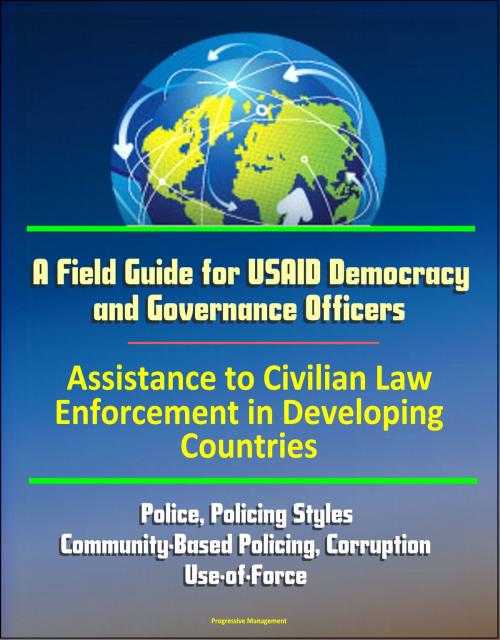A Field Guide for USAID Democracy and Governance Officers: Assistance to Civilian Law Enforcement in Developing Countries - Police, Policing Styles, Community-Based Policing, Corruption, Use-of-Force
Nonfiction, Social & Cultural Studies, Political Science, Politics, Law Enforcement| Author: | Progressive Management | ISBN: | 9781310018220 |
| Publisher: | Progressive Management | Publication: | March 14, 2015 |
| Imprint: | Smashwords Edition | Language: | English |
| Author: | Progressive Management |
| ISBN: | 9781310018220 |
| Publisher: | Progressive Management |
| Publication: | March 14, 2015 |
| Imprint: | Smashwords Edition |
| Language: | English |
Professionally converted for accurate flowing-text e-book format reproduction, this unique document is a "field guide" intended to support USAID Democracy and Governance Officers as they consider police assistance programs in developing countries. The guide establishes the importance of public safety as a cornerstone of successful development. The Inter-agency environment and identification of risk and risk management is presented. A short background section traces the development of various policing styles including community-based and information-driven. The link between pervasive operational problems in developing world policing such as corruption, excessive use of force and poor criminal investigations and back office or "substructure" dysfunction is clearly identified. The importance of connecting leadership to change management as part of police reform is discussed as a logical means to achieve long-term, successful police reform. Multi-disciplinary methods to address crime and security problems including prevention/intervention/enforcement framework are recommended. "Program checkpoints" are included as a guide to project development. "Important Characteristics, Typical Findings and Programming Notes" are presented for all of the major functions in a modern police agency. Sample project approval documents, resource materials and electronic links provide access to additional information.
Acronyms * Abstract * Foreword * Executive Summary * Section I: Introduction * Civilian Police, Criminal Justice Development and USG Foreign Assistance Strategy * Why Engage Civilian Police? * The Risks * USAID, the Interagency Environment and Civilian Police Assistance * Section II: Established Policing Styles * How Policing Has Been Done * Political Style * Reform or Professional Style * Community-based Policing * Information Driven Policing * Section III: Building Blocks of the Modern Civilian Police Service Capability * Democratic Policing Principles - The Basis for a System of Core Values * Legal Systems and Civilian Police Authority - From the Constitution to the Street * Common Law vs. Civil Law Systems * The Legal System, Criminal Investigation and Civilian Police Structure * Legal Authority and Civilian Police Leadership * Limiting Civilian Police Authority * Adapting Civilian Police Authority to Changing Conditions * Line, Staff and Information Management - An Organizing Concept for Civilian Police * Section IV: Three Common Civilian Police Problems, One Common Cause: Substructure Dysfunction * Ineffective Investigations * Corruption * Excessive Use-of-force * The Direct Relationship between Substructure and Poor Civilian Police Service * Section V: Approaching Assessment and Programming * Assessment * First Steps * When Civilian Police Assistance Is Not An Option * Principles of Change * Support for Change * Change Leaders - An Institutional Approach * A More Focused Approach * The "Crime Reduction Goal" * Community-based Police Programming * Developing Indicators * Annex 1: Program Checkpoints * Preparation, Planning and Assessment * Implementation * USG Program Management * Annex 2: Important Characteristics, Typical Findings and Programming Notes * Staff Functions * LEADERSHIP/CULTURE/PURPOSE/VALUES * Management and Supervision * Relationships and Attitude * External Relationships * Internal Relationships * PROFESSIONAL STANDARDS * Internal Investigations * Audits/Inspections * Policy/Procedure * Training * Personnel * Staff Support/Organizational Development * Process/Structure * Budget/Planning * Performance Measurement * Line Functions * Patrol * Investigations * Special Capabilities * Public Order Management * Hostage Rescue/Negotiations and Related Skills * Intelligence * Gang Enforcement * Traffic Enforcement * Trafficking in Persons * Drug Enforcement * Line Support Functions * Forensic Science/Evidence Management * Communications * Transport * Logistics * Facilities
Professionally converted for accurate flowing-text e-book format reproduction, this unique document is a "field guide" intended to support USAID Democracy and Governance Officers as they consider police assistance programs in developing countries. The guide establishes the importance of public safety as a cornerstone of successful development. The Inter-agency environment and identification of risk and risk management is presented. A short background section traces the development of various policing styles including community-based and information-driven. The link between pervasive operational problems in developing world policing such as corruption, excessive use of force and poor criminal investigations and back office or "substructure" dysfunction is clearly identified. The importance of connecting leadership to change management as part of police reform is discussed as a logical means to achieve long-term, successful police reform. Multi-disciplinary methods to address crime and security problems including prevention/intervention/enforcement framework are recommended. "Program checkpoints" are included as a guide to project development. "Important Characteristics, Typical Findings and Programming Notes" are presented for all of the major functions in a modern police agency. Sample project approval documents, resource materials and electronic links provide access to additional information.
Acronyms * Abstract * Foreword * Executive Summary * Section I: Introduction * Civilian Police, Criminal Justice Development and USG Foreign Assistance Strategy * Why Engage Civilian Police? * The Risks * USAID, the Interagency Environment and Civilian Police Assistance * Section II: Established Policing Styles * How Policing Has Been Done * Political Style * Reform or Professional Style * Community-based Policing * Information Driven Policing * Section III: Building Blocks of the Modern Civilian Police Service Capability * Democratic Policing Principles - The Basis for a System of Core Values * Legal Systems and Civilian Police Authority - From the Constitution to the Street * Common Law vs. Civil Law Systems * The Legal System, Criminal Investigation and Civilian Police Structure * Legal Authority and Civilian Police Leadership * Limiting Civilian Police Authority * Adapting Civilian Police Authority to Changing Conditions * Line, Staff and Information Management - An Organizing Concept for Civilian Police * Section IV: Three Common Civilian Police Problems, One Common Cause: Substructure Dysfunction * Ineffective Investigations * Corruption * Excessive Use-of-force * The Direct Relationship between Substructure and Poor Civilian Police Service * Section V: Approaching Assessment and Programming * Assessment * First Steps * When Civilian Police Assistance Is Not An Option * Principles of Change * Support for Change * Change Leaders - An Institutional Approach * A More Focused Approach * The "Crime Reduction Goal" * Community-based Police Programming * Developing Indicators * Annex 1: Program Checkpoints * Preparation, Planning and Assessment * Implementation * USG Program Management * Annex 2: Important Characteristics, Typical Findings and Programming Notes * Staff Functions * LEADERSHIP/CULTURE/PURPOSE/VALUES * Management and Supervision * Relationships and Attitude * External Relationships * Internal Relationships * PROFESSIONAL STANDARDS * Internal Investigations * Audits/Inspections * Policy/Procedure * Training * Personnel * Staff Support/Organizational Development * Process/Structure * Budget/Planning * Performance Measurement * Line Functions * Patrol * Investigations * Special Capabilities * Public Order Management * Hostage Rescue/Negotiations and Related Skills * Intelligence * Gang Enforcement * Traffic Enforcement * Trafficking in Persons * Drug Enforcement * Line Support Functions * Forensic Science/Evidence Management * Communications * Transport * Logistics * Facilities















